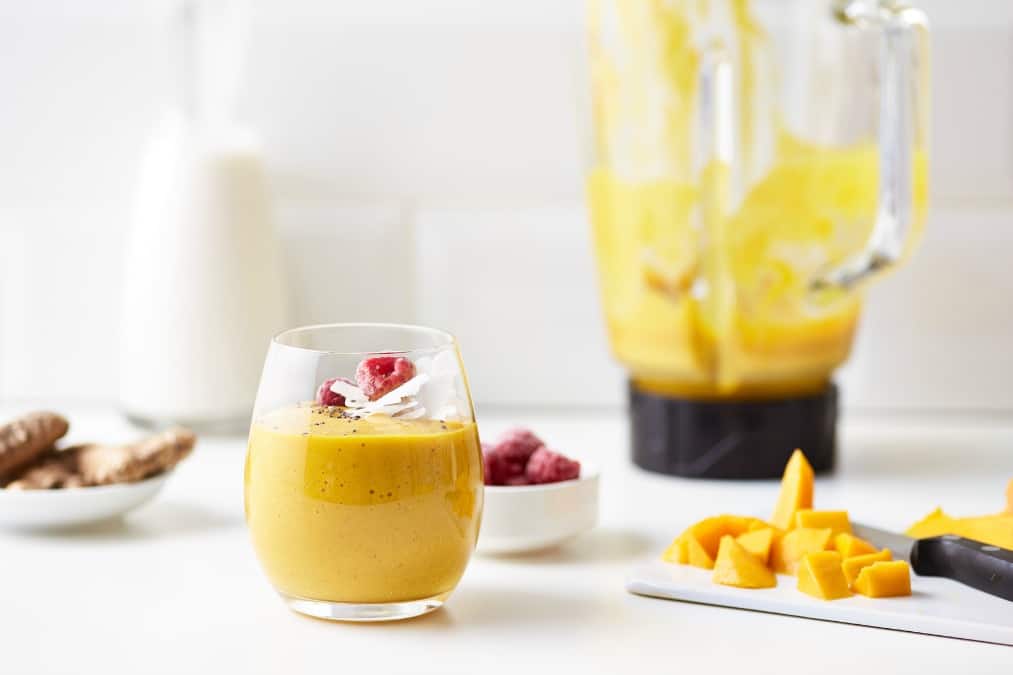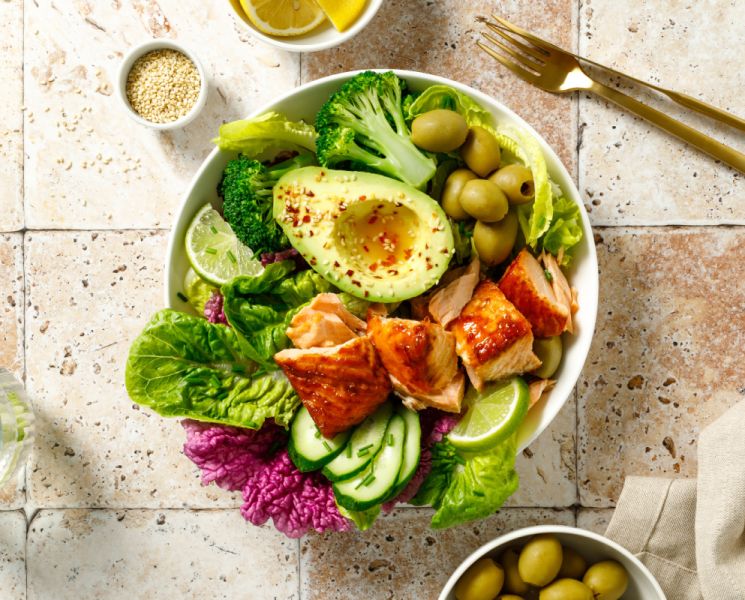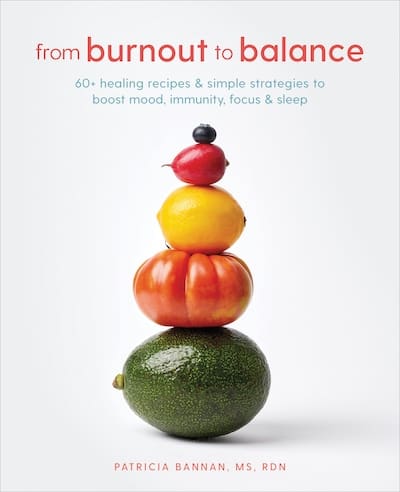Gut health has become a dominant topic in nutrition science. How can you improve your gut health naturally? Here are six ways.
The more we learn, the more we realize that our stomachs have more of an effect on our overall health than we ever thought possible. From diabetes to cancer to autism, there’s a good chance that your overall gut health (or gut microbiome) is associated with every disease you can think of. While there are certainly some “bad bugs” you don’t want growing in your gut, there are a lot of useful microbes along for the ride.
Certain foods and activity choices are easy to incorporate into your daily or weekly routine. No more wondering how to improve your gut health naturally. Your solutions are here!
6 Ways to Help Improve Gut Health Naturally
- Add mango to meals and snacks
- Eat broccoli
- Incorporate whole grains
- Add kefir to your dairy options
- Enjoy coffee in moderation
- Maintain an active lifestyle
1. Mangos and Gut Health
Mangos provide antioxidants, fiber, and over 20 different vitamins and minerals. A one-cup serving has been well-documented to exhibit anti-inflammatory activities and aid in digestion.
In addition, one study published in the Journal of Nutrition looked for the first time at the effect of mango on gut health in mice fed diets that differed in fat content. For mice in the high-fat diet group, mango supplementation was found to prevent the loss of beneficial gut bacteria often induced by a high-fat diet.
Simple ways to add some mango to your meals and snacks:
- Slice up a mango and eat it as a snack with some nuts
- Blend frozen mango into a smoothie
- Add diced mango to a chopped salad, yogurt parfait, or homemade salsa for some refreshing tropical flavor
2. Broccoli and Gut Health
While other cruciferous vegetables like kale and Brussels sprouts have stolen the culinary limelight lately, a recent study suggests that broccoli should not be overlooked as a food for gut health.
In a study that used both cooked and raw broccoli, rats showed positive changes in their colonic flora (organisms living in the digestive tract) after only four days of consumption. Another interesting finding was that the changes were reversed after four days without consuming broccoli. More research is necessary to see how this would affect humans, but consistent intake of broccoli might be a good way to improve your gut health.
Simple ways to add broccoli to your diet:
- Roast broccoli with a bit of olive oil, garlic, salt, pepper, and fresh herbs
- Cube broccoli stalks and add to a soup, pasta, or casserole
- Blanche broccoli florets and add to your favorite salad before chilling
3. Whole Grains and Bowel Health
Whole grains contain important nutrients like protein, fiber, and B vitamins. They also improve bowel health by helping to maintain regular bowel movements and promote growth of healthy bacteria in the colon. Whole grains (like barley, brown rice, buckwheat, and quinoa) contain the germ, endosperm, and bran, of the grain; whereas, refined grains only retain the endosperm.
A study published in the American Journal of Clinical Nutrition found that participants who were fed a diet rich in whole grains for two weeks saw improvements in their stool weight and frequency, as well as gut bacteria, compared to people who were fed a diet with refined grains.
Simple ways to add more whole grains to your diet:
- Choose a fiber-rich, whole grain breakfast cereal or start your morning with a bowl of warm oatmeal
- Experiment with different whole grains like buckwheat, bulgar, and millet
- Enjoy a whole-grain snack like popcorn or 100% rye crackers with hummus
4. Kefir, Probiotics, and Gut Bacteria
With a name derived from the Turkish word “keif” (meaning “good feeling”), this fermented dairy beverage is not a new invention. However, it is finding increasing popularity in the U.S. along with other fermented foods as a way to improve intestinal health.
Kefir is super rich in probiotics. Research suggests that these probiotics contribute to a healthier gut by supporting the growth of good bacteria as well as challenging the development of disease-causing bacteria. Since many flavored Kefir products on the market can be loaded with added sugar, look at the label and choose one with 12 grams of sugar or less per cup. Ideally, you can find a plain version and mix in your own fruit for added natural sweetness.
Try this Mango Kiwi Kefir Lime Smoothie for a boost to your microbiome.
Simple ways to incorporate more probiotics in your meals:
- Add Kefir to your smoothies, as well as dips and homemade baked goods like pancakes or muffins
- Enjoy a glass of kombucha, a fermented green or black tea drink
- Experiment with fermented foods like sauerkraut, pickles, miso, tempeh, and kimchi

5. Coffee and Gut Bacteria
If you’re like me, the aroma of a morning cup of Jo is worth getting out of bed for. And while too much of a good thing is, well, too much, recent studies have pointed to the health benefits of coffee in moderation. In addition, there is evidence to suggest that coffee may have a positive effect on the gut as well.
In one study, bacteria living in the gut were compared in mice that were given coffee, a probiotic, or water. Compared to water, coffee consumption changed the types of gut bacteria by decreasing the amount of potentially harmful types of bacteria while increasing the amount of a type of helpful bacteria. The coffee was prepared from whole beans, so consider grinding your own at home to cut down on the oxidation of important compounds.
Try these healthy holiday coffee drinks that are fun to incorporate throughout the year to elevate your coffee game.
Simple ways to enjoy more coffee:
- Brew up a cup of coffee, espresso, or a latte made with unsweetened milk, then top it with some cacao powder
- Try making some dark chocolate covered coffee beans for a dessert
- Remember to enjoy coffee in moderation to avoid energy slumps and trouble sleeping
6. Maintaining an Active Lifestyle
In addition to including specific foods in your diet for a healthy gut, how much you move appears to be important as well.
A study published in 2017 divided female volunteers into two groups based on their activity levels: active and sedentary. The definition for sedentary activity was that of the World Health Organization, which is less than 30 minutes of activity three times a week. At least three hours of exercise weekly was considered necessary to be classified as active.
When gut bacteria was analyzed, there was an inverse relationship between sedentary activity and microbial “richness.” This means that people who displayed the most sedentary habits were more likely to have fewer identified species of helpful bacteria in their gut.
Simple ways to stay active:
- Find a resistance program you enjoy and plan to incorporate resistance exercise at least 2 times a week
- Take work calls while standing or walking around your office space
- Find an exercise class online or through an app for indoor exercise
Consider this as one more reason to add a few brisk walks to your routine each week and inspiration for some different foods to include in your diet to improve your gut health naturally!





